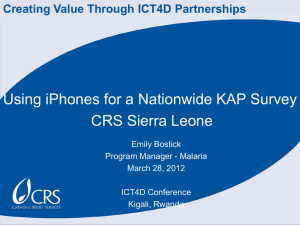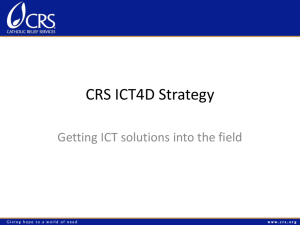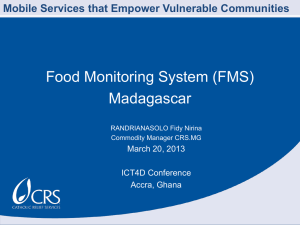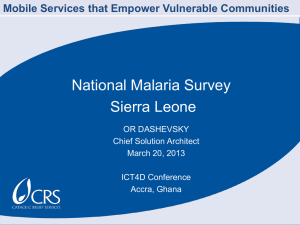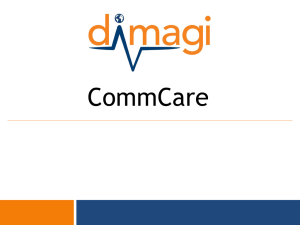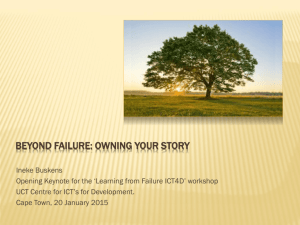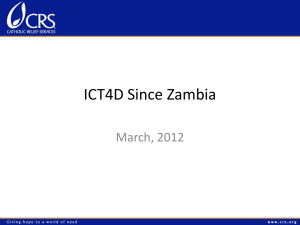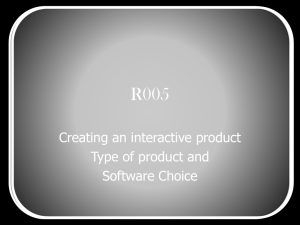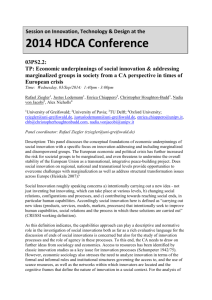Going mobile for maternal and child survival
advertisement
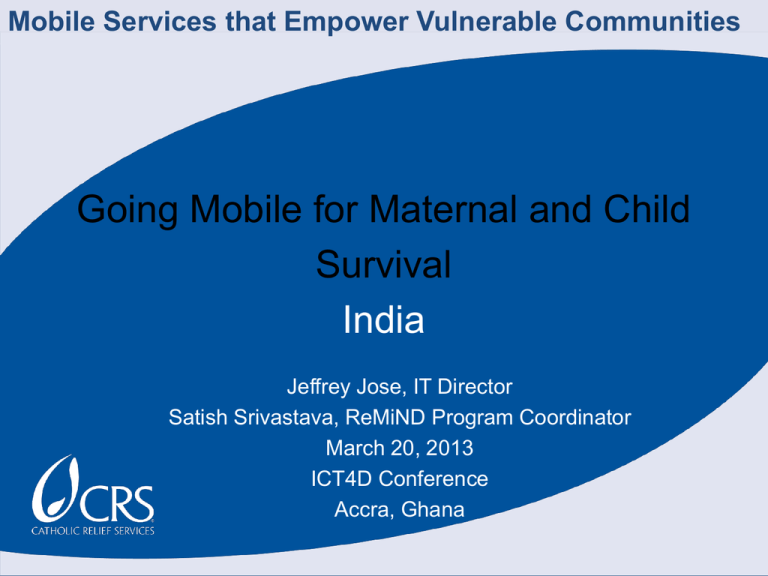
Mobile Services that Empower Vulnerable Communities Going Mobile for Maternal and Child Survival India Jeffrey Jose, IT Director Satish Srivastava, ReMiND Program Coordinator March 20, 2013 ICT4D Conference Accra, Ghana Project Background • Reducing Maternal and Newborn Deaths (ReMiND) Project • Partners: Dimagi Inc., Vatsalya, Government of UP • Area of Intervention: 2 blocks of Kaushambi District, Uttar Pradesh (India) • Opportunity & Issues: 1. ASHA (CHW) have limited training and support to carry out effective home visits to pregnant and postpartum women, newborns and to do RI follow-up with infants. 2. Project use of ICT solutions for ASHA, highlighted further opportunities to use ICT for project monitoring, baseline and endline evaluation. Monitoring Tools Job Aids & Beneficiary Details Baseline & Endline Surveys ICT4D in ReMiND ICT4D Solution • Dimagi’s open-source CommCare software – Cloud-infrastructure: CommCare HQ • Baseline data collection with Samsung Galaxy Tab 2 tablets – Nokia C2-01 used for ASHA and monitoring apps • CRS/India’s IT & PQ teams led baseline app development with backstopping from Dimagi • Required staff support: – Health and M&E expertise to develop app content – IT expertise to identify hardware and build app Key Successes • More efficient and cost effective than paperbased surveys • Improved data quality through built-in checks/controls and review of real-time data • Having app developer on-site allowed rapid revision during field testing and survey • User-friendly app & hardware allowed first-time users to easily become proficient with this ICT4D solution • Samsung Galaxy Tab 2 was a good choice for tablet in terms of battery life, resolution and usability. Key Successes • No problems with battery life or damage occurred due to a strict routine for daily issue, return and charging of tablets and a contract with enumerators for hardware loss/damage. • Tablet configuration with limited access to other applications prevented users from playing with or changing settings • Strong history of partnership with Dimagi allowed CRS/India to already have gained the required IT expertise for in-house app development • Pool of ICT-enabled female data collectors for future surveys • Feedback from OR team on their CommCare/tablet experience helped CRS better prepare for baseline survey Key Issues / Challenges • Tablet procurement took longer than anticipated resulting in a final rush to configure and ensure timely delivery to the field • Preparation of training materials was rushed due to delays in finalizing the baseline survey application (tool) Lessons Learned • ReMiND’s ICT4D solution strengthens ASHA’s confidence & credibility with rural communities, and enables them to provide higher quality care to vulnerable women and children. • Using ICT for project M&E helps to establish quality data that can ultimately contribute to global evidence on mHealth’s potential to help improve MNCH outcomes • Invest in staff and partner capacity. Because of the wide range of skills and knowledge required, it is important to develop expertise across CRS and partner staff to ensure CommCare knowledge and capacity is sustained throughout and across projects. Summary and Close • It takes a team. Successful application development and roll-out requires cross-sectoral (health, M&E, etc.), technology, translation, training and implementation expertise. Take this into consideration and plan accordingly when developing your ICT4D solution. • Allow enough time. To maximize ICT4D solutions for M&E, allow sufficient time at every stage of the process: ICT platform selection, application development, hardware identification and procurement, training prep and roll-out, implementation, data analysis and use. • Be committed and don’t be shy. Using ICT for monitoring and survey data collection is less challenging than it might first seem. Reach out to other country programs or organizations with experience and commit to investing the necessary time and resources to make the most of what it offers. Then share your experience! Thanks
